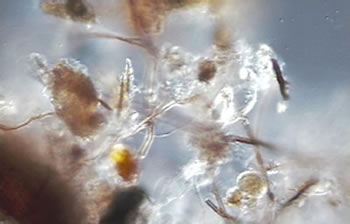The Secret Life of Fungi

Pictured: Microscopic fungi photographed by the Soil Foodweb Inc.
Once considered pathogens, microscropic fungi that live in soil are shaping plant communities and aiding efforts in environmental restoration.
Fungiare comprised of microscopic cells that grow in long threads called hyphae. Fungal hyphae bind soil particles into macro-aggregates which increase the soil’s ability to absorb and retain water. Fungi also play an important role in the breaking down of organic matter into useful forms and assists in nutrient retention and disease suppression.
Mycorrhizal fungi colonise the roots of most plant species, forming a mutually beneficial relationship that has a significant role in nutrient uptake and protects against root feeding nematodes and pathogens. Mycorrhizal fungi are especially important in supplying plant available phosphorus. Many studies have documented a decrease in mycorrhizal colonisation when soluble phosphorus levels are high, usually as a result of excessive use of inorganic fertilisers.

Mycorrhizal Fungi live on the root zone of the plant.
Pictured above are some mychorrhizal fungi on a corn root.
Other kinds of fungi are those that live in leaf litter and top soils and feed by breaking down organic matter.
We believe that uncovering and nurturing the secret life of fungi is of vital importance to the world today. We ask, when so many agricultural systems are failing and the world seems to be moving towards towards increasing drought and harsher climatic conditions, what can we do to feed and strengthen both the Fungi and its related Soil Foodweb?
The first step is for all of us to protect and nuture the Fungi and understand their secrets and subsequent importance.
At Groundgrocer we specialise in providing a huge range of living soil products that support the Fungi to once again become plentiful and recolonise our planets soils,
- Quality composting equipment
- BioActive compost, and
- BioActive compost tea brewers and supplies
- Biological farming supplies
We supply products, equipment and services that enhance the "Soil Foodweb" microbiology communities and build healthy soil. We advocate the use of organically based additives that do not harm the beneficial creatures in the soil and we do not recommend standard heavy applications of urea, lime or gypsum etc.
 Australian Dollars
Australian Dollars
 US Dollars
US Dollars
 European Euros
European Euros
 New Zealand Dollars
New Zealand Dollars
